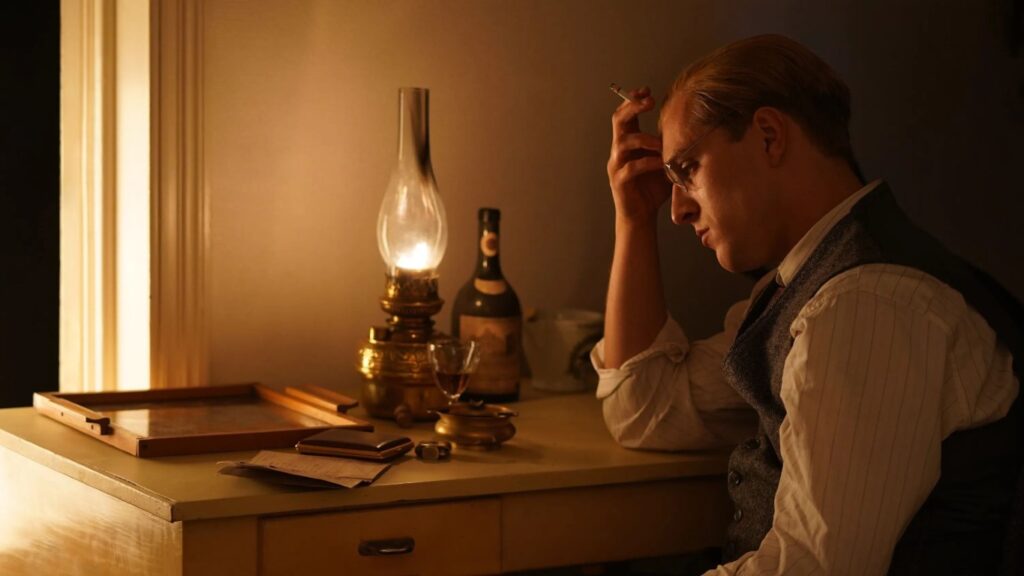Bonhoeffer is a biopic that follows Dietrich Bonhoeffer, a German pastor who resisted Hitler and the Nazis’ takeover of the churches in Germany. The film explores courage, faith and resistance during one of the darkest histories of the world. It’s directed and written by Todd Komarnicki and stars Jonas Dassler as the titular figure.
Komarnicki rediscovered Bonhoeffer’s story later in life and shared how he connected with the historical figure:
“He just represented a kind of fierce bravery that was deeply inspirational,” Komarnicki tells Nerd Reactor. “And also made me look in the mirror and say, ‘Am I living a fully brave life? And what does that look like in this day and age?’”
The reflection of Bonhoeffer’s courage helped build the core of the film.
The Church and Nazi Germany
The horrors of Hitler’s actions included the treatment of the Jewish community and his strategy on the battlefield of World War II. The film sheds light on how Hitler planned to take over the German churches.
“The first thing [Hitler] did when he came to power was take over the churches… He removed all the crucifixes and put up swastikas in the church. He removed the Bible and put in Mein Kampf. It sounds so cartoony and bizarre that it can’t be possible, but it happened.”Balancing History and Art
Trying to capture the life of a historical figure like Bonhoeffer and squeeze it into a film can be daunting, and as a result, creative liberties were required to make it cohesive. Other creative liberties included a spiritual metaphor; for example, a scene featuring Bonhoeffer playing music with Louis Armstrong in a jazz club:
"So here's what the facts were. [Bonhoeffer] was living in Harlem, and he was introduced to jazz by his best friend, Frank Fisher, and they went to Smalls Paradise Club a lot. All of that is fact. Louis Armstrong played at Smalls Paradise Club a lot. That is also fact. Whether they were in the building at the same time, most likely, I don't know for sure, but most likely the other thing is seeing jazz brought Dietrich's music back to him, because he had stopped playing after the death of his brother, so he hadn't played piano since he was, you know, nine or 10, and suddenly he wanted to play piano again. Music was brought back to life because of jazz and the connection between the black community and jazz and Dietrich and Europe and classical music. I thought if these guys can play music together, because he and Frank became best friends. If they can play music together, then we have that spiritual bridge where people are understanding each other on a deeper level" A Timely Message for Modern Audiences
Today’s world is polarized, and Bonhoeffer’s legacy is still relevant. Komarnicki reflects on the parallels between the past and present:
“As soon as you limit another person’s humanity… you don’t mind when they suffer. This is how fascism rises… and we need to be aware right now, how this happened, and what we can do about it.”The theme that the director wanted out of the film is that of fostering compassion and fighting injustice:
“The true revolution is love… The one unstoppable weapon in the history of the world is love, because it does the thing we need. It disarms.”About Bonhoeffer
Synopsis: When a pacifist is called to a political act that could change the course of history, how will a man of honor respond? This is the true story of Dietrich Bonhoeffer, a man who preached love while plotting the assassination of an evil tyrant. With world-shattering stakes, Bonhoeffer: Pastor, Spy, Assassin – begs the question, how far will you go to stand up for what’s right?
The film stars Jonas Dassler as Dietrich Bonhoeffer, August Diehl as Martin Niemöller, David Jonsson as Frank Fisher, Flula Borg as Hans von Dohnanyi, Moritz Bleibtreu as Karl Bonhoeffer, Nadine Heidenreich as Paula Bonhoeffer, Patrick Mölleken as Walter Bonhoeffer, William Robinson as Eberhard Bethge and Clarke Peters as Reverend Powell Sr.
The film was released in U.S. theaters on November 22, 2024.






